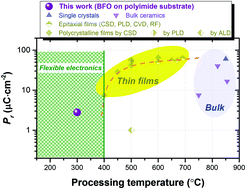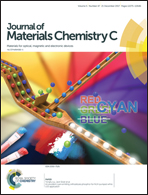Direct fabrication of BiFeO3 thin films on polyimide substrates for flexible electronics
Abstract
One of the major challenges for the integration of functional oxides as ferroelectrics into flexible electronics is the reduction of their processing temperature below that which causes the degradation of plastic substrates. With this aim, particular attention has been given to the low-temperature processing of oxide films by chemical solution deposition methods. In this work, lead-free multifunctional and multiferroic BiFeO3 (BFO) thin films were fabricated for the first time at a temperature as low as 300 °C directly on flexible polyimide substrates by our own proprietary solution-based Seeded Photosensitive Precursor Method. Despite this exceptionally low thermal budget, a remanent polarization, Pr, of 2.8 μC cm−2 was obtained for these BFO films, with a coercive field, Ec, of 380 kV cm−1. In addition, and of significant relevance, the films exhibited a room temperature ferromagnetic response, showing for the first time the multiferroic behaviour at room temperature of BFO films prepared at 300 °C. The ferroelectric, piezoelectric and ferromagnetic functionalities demonstrated for these films revealed their potential for applications in microelectronic devices as well as their feasibility for being used in flexible electronics. The results shown here are a proof of concept of the Seeded Photosensitive Precursor Method for the successful integration of lead-free ferroelectric thin films with flexible plastic substrates and have a broad impact in terms of the extended use of functional oxide thin films processed with low thermal schedules.



 Please wait while we load your content...
Please wait while we load your content...